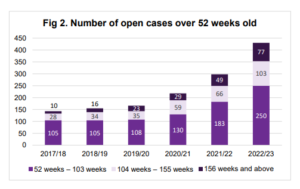Nitrous Oxide
Government concern about the use of nitrous oxide has led to an announcement that the government will legislate to make nitrous oxide a Class C drug. The sanction for unlawful possession will be up to 2 years in prison or an unlimited fine and up to 14 years for supply or production.
At present, nitrous oxide is currently captured under the Psychoactive Substances Act 2016 and the supply of nitrous oxide for recreational use is banned, but possession is not.
The change will be brought in by Misuse of Drugs Act 1971 (Amendment) Order 2023 to amend a schedule to the Misuse of Drugs Act. The House of Lords debated the order at the end of September and there was some criticism:
“The Government now seem intent on using the Misuse of Drugs Act 1971 to deal with what is mainly a small-scale anti-social behaviour and littering problem. This seems inappropriate. It is the legislative equivalent of taking a knife to a spoon fight.” Earl Russell (LD) Hansard.
There is recognition that there are legitimate uses of nitrous oxide, and the government has said it does not want to hinder responsible medical use.
It is intended that a further related statutory instrument will come into force at the same time as the Order. This will amend the Misuse of Drugs Regulations 2001 and place Nitrous Oxide under schedule 5 of the 2001 Regulations (with the addition of a possession and importation and exportation offence). An exemption for legitimate use will be included to ensure that persons carrying on activities which do not relate to the consumption of nitrous oxide for its psychoactive effects are not criminalised.
Advertising
The Advertising Standards Authority (ASA) has challenged a number of advertisements over this year for breaching the UK Code of Non-broadcast Advertising and Direct & Promotional Marketing (CAP Code). The CAP Code follows legislation and states that POMs or prescription-only medical treatments may not be advertised to the public.
ASA says that ensuring these rules are followed is a high priority area and cites as an example that following an Enforcement Notice in 2020, fifty thousand adverts for Botox withdrawn from Instagram.
Some of the earlier cases this year related to sclerotherapy, a treatment for varicose veins, which requires the use of a POM. The ASA concluded that since the adverts promoted sclerotherapy treatments, therefore POMs, to the general public, they breached the Code and should be banned. Examples of banned adverts in September 2023 included a B12 vitamin injection kit listed on etsy.com and an Instagram post offering aesthetic treatment.
ASA have said “We’re using these rulings to remind practitioners to be mindful of the rules around POMs. Ads shouldn’t appear on social media, and on websites they can advertise a service but not a specific product. They should avoid before[1]and-after photos, special offers or prizes.”
GPhC Fitness to Practise
Case Report
At the GPhC’s Fitness to Practise (FtP) committee Mr Nazim Hussain Ali was again issued with a warning for comments he made at an Al Quds Day Rally. The original decision was quashed by the High Court which found the FtP committee was wrong when it said the remarks were offensive but not antisemitic. The court said in respect of the original FtP committee’s decision.
“It wrongly took account of Mr Ali’s intention when assessing whether his language was objectively antisemitic. It wrongly took account of his character when assessing whether his language was objectively antisemitic. And it erroneously failed to assess whether the remarks, considered cumulatively, were objectively antisemitic, as opposed to whether each remark in isolation was antisemitic.”
At the new hearing it was found that two of the four remarks were anti -semitic. In issuing the warning, the committee took into account factors in mitigation, including the fact that there had been no repeat of the misconduct at any time in the six years since the comments were made.
Delays escalated
The Professional Standards Authority (PSA) published their annual review of the GPhC. They have concerns about the time it takes the GPhC to deal with fitness to practise cases. They found no evidence that timeliness had improved in 2022/23 and said the number of open older cases had increased. (See attached graphic from the PSA report.) As this is the fifth year in a row that the GPhC has not met the relevant Standard the PSA have written to the Secretary of State for Health and Social Care and the Chair of the Health and Social Care Committee to raise concerns and have said they will be monitoring closely.

Image source: Professional Standards Agency (PSA) professionalstandards.org.uk
Frequently Asked Question
Our frequently asked question for this edition is prompted by our clients’ concern about the recent seismic market shifts:
Consolidations: how useful are they?
Consolidations are the ability, under regulation 26A of the NHS (P&LPS) Regulations to consolidate two pharmacies onto one site. The advantage is that NHS England must consider whether the relocating pharmacy will leave a gap in provision of pharmaceutical services at the location where it closed. If it is accepted there is no significant gap in provision that can be stated in an update to the PNA which is important for the consolidating pharmacy.
Just a few initial pointers from calls received:
- The consolidation provision only covers consolidations in the same HWB area.
- The pharmacies consolidating do not need to be owned by the same entity.
- The advantage only lasts as long as the PNA. We are settling into a new PNA cycle so now is a good time to consolidate.
- If the application is made and not granted then that means that NHS E thinks there will be a gap – cue rush of applications if there is a closure anyway?
- The advantage would not apply to distance selling pharmacies as it is not a need-based application in any event.
- The hours of opening are the hours of the pharmacy which remains open.
Please do call if you have any questions. If you would like advice on any of the issues above , please contact the author.
CQC – Single Assessment Framework
For those regulated by the CQC, a new regulatory approach has been announced – the Single Assessment Framework. It may be rolled out, initially to the South of England, as early as November 2023. Gordons lawyers Neil Grant and Lucy Bowker have written about this in their article in Care Talk “What does CQC’s new approach to assessment mean for me?”
Property Corner by Adrian Jones
A brief window into the potentially confusing world of security of tenure.
You are buying a lease of a pharmacy! Great! You know how to run a pharmacy, but do you know whether your new lease has security of tenure or not and do you know why this matters?
If the answer to either of those questions is “no” then read on.
Commercial leases come in all shapes and sizes, but have one characteristic that sets them apart from other leases – unless steps are taken to exclude it, they come with “security of tenure”.
If security of tenure applies to a lease, then that lease will not automatically come to an end at the end of the initial fixed term – it will continue on until either the landlord or tenant take steps to bring it to an end and, usually, the tenant will have a right to renew the lease.
Alternatively, the lease could be granted without security of tenure, where steps are taken before the grant of the lease to exclude security of tenure from that lease. The principal effect of granting a lease without security of tenure is that the tenant of that lease will have no right to renew and when the initial fixed term comes to an end, the lease will end and the tenant will have to vacate. Because security of tenure is governed by the Landlord and Tenant Act 1954, leases with no security of tenure are commonly described as being “outside the Act” or “excluded”.
From a commercial point of view, the benefits of having security of tenure for the tenant are clear – if business is going well at the end of the term, and the tenant wants to, it can usually apply to the landlord for a new lease which, save for certain circumstances (such as where the tenant has failed to comply with the terms of the lease or the landlord wants the property back for its own purposes, etc.) the landlord will have to grant the new lease.
If, when negotiating the terms of a new lease, you are asked to give up security of tenure (or told that its standard for new leases to be excluded) think carefully before agreeing – you may be giving up the right to renew your lease at the end of its term.
If you would like advice on property matters, please contact;
- Adrian Jones
- Tel: 01483 451 900
- Email: adrian@gordonsols.co.uk
About the Author

Susan Hunneyball
Healthcare Regulatory Lawyer
- Tel: 01483 451 900
- Email: susan@gordonsols.co.uk
This update should not be taken as advice for any particular circumstance and legal advice should be sought for a specific matter.
